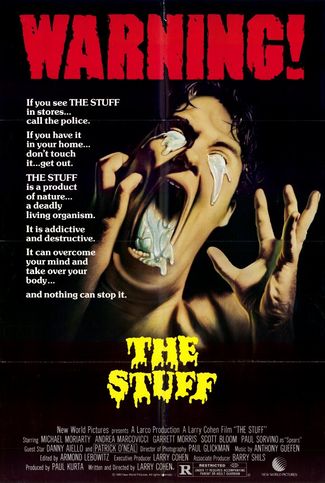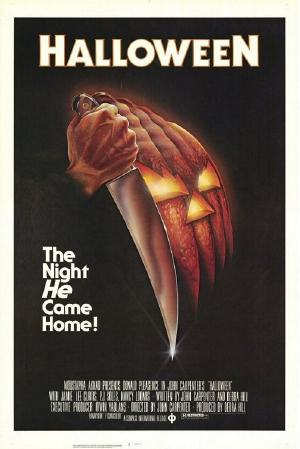
The Movie: Francesco Dellamorte (Rupert Everett) is the caretaker for the cemetery in the small Italian town of Buffalora. This is a lot harder than it sounds; because the dead have a habit of coming back within seven days of being buried there, and only destroying the brain will put them down permanently. Dellamorte and Gnaghi (Francois Hadji-Lazaro), his developmentally stunted assistant, have their hands full; and it gets worse as, due to town bureaucracy and political expediency, there’s no outside help for them.
Francesco’s already unstable and stifling world is turned completely upside down when his eyes first land upon a grieving widow (Anna Falchi); “the most beautiful living woman [he’s] ever seen.” Despite his rather limited social skills Dellamorte does manage to strike up a romance with her, but it can’t last. When they make the stupid decision to have sex on her late husband’s grave, he digs himself out and attacks her. Francesco stands over her body, praying she won’t come back as a ‘returner’ (the movie never uses the word ‘zombie’); but of course that prayer is not granted, and sadly, he uses his pistol to put her down. A while later Francesco realizes his mistake when he runs into her as a returner and has to be saved by Gnaghi. The fact that she came back means that she wasn’t really dead that first time, and Dellamorte killed her.
Things get worse as Dellamorte struggles to forget her and continue doing a job that he hates, but can’t ever seem to escape from. Two major series of events knock his already wobbly world completely out of orbit. The first is the consistent reappearance of the object of Dellamorte’s affections in various different roles; always giving him hope that he can re-obtain her, but ultimately leaving him all the worse for it. The second is an appearance by Death himself, who tells Dellamorte to stop killing his dead; if he really doesn’t want them coming back as returners, then he should just start shooting the living in the head so they can’t come back in the first place…
The Review:
“Nyah!"
-Gnaghi
It is once again the time for what seems to be becoming a tradition for this blog; my yearly one-fingered salute to that unholiest of holidays, Valentine’s Day. Suffice to say, I hate and detest it. I elaborated at length on my reasons why last year in my review of How to Lose a Guy in Ten Days, so I shant repeat them here. If you’re interested, please read that review.
It would seem that, in this country at least, the French have a reputation for making confusingly weird movies. In recent years I have watched a lot of European movies, particularly French ones; largely, I’m sure, due to my fetish for women with French accents. In that time I have made this discovery: when it comes to truly batshit movies that leave you confused, uncertain, and nursing migraines, the French ain’t got nothing on the Italians.
From the 1960s to the early 1990s, the Italians had a major B-movie industry that, among other things, excelled at ripping off popular big-budget movies and movie genres. Spaghetti westerns (now you know why they’re called that), post-apocalyptic movies, porn, space opera, zombie gut-munchers; the Italians would take them all and add their own bizarre interpretations. For quite some time, your movie hadn’t arrived until it was the subject of countless Italian interpretations. I don’t know what the status of the Italian film industry is today; but the B-movie machine of around three decades is certainly long gone, and the world is so much poorer for it.
Cemetery Man, or Dellamorte Dellamore as it was originally titled in Europe, came in around the tail end of this period. It is one of those movies that are impossible to shoehorn into a conventional Hollywood genre. While the basic plot may seem like a horror movie, Cemetery Man is anything but. Likewise, while not, technically, a comedy; this is one seriously funny movie. Also, it’s not exactly a romance; although it definitely borrows more than a few conventions from that genre. If I had to sum up Cemetery Man, I would define it as a philosophical meditation on love, and on life in general, that just happens to feature zombies and a really twisted sense of humor.
Cemetery Man is about Francesco Dellamorte, a man who is so wrapped up in death that he has almost completely forgotten how to live. And by ‘death’ I don’t just mean the obvious trappings such as the graveyard and the returners. Buffalora itself is so wrapped up in bureaucracy and appearances that it’s utterly stifling. One look at the records office run by Francesco’s friend Franco (Anton Alexander), and you’d think they had a form for everything. The chief of police (Mickey Knox) is the kind of man to form an opinion, and then ignore anything that contradicts said opinion. As an example, when Dellamorte is walking out of a hospital where he’s just shot three people, visibly holding the gun, the policeman tells him “oh good, you have a gun, you’ll be able to defend yourself.” And then there’s the mayor (Stefano Masciarelli), who’s so fixated on getting reelected for a sixteenth term that he’s willing to exhume his own daughter (Fabiana Formica) to use on his campaign posters.
Things don’t help matters when Dellamorte’s love interest (never actually named, and billed as “She” in the credits) comes into the picture. Actually, that’s a gross understatement. In so many ways, their romance is so much like the tragic, overdramatic relationships pop culture tells us romance is supposed to be. And yet, the movie does not hesitate to show us just how unhealthy it actually is. Dellamorte is obsessed, and when the object of his obsession slips his grasp yet again, he’s all the worse off for having thought he had a chance in the first place. The sacrifice he makes for her in her incarnation as the new mayor’s assistant will really make you wince and squirm, especially if you’re male.
So in short, Dellamorte finds himself trapped and in a no-win situation. There is his romantic cycle of see, want, thinks he has a chance, ‘whoops, just kidding.’ Then there’s his job, which he hates, but can’t seem to get away from. The scenes where he sacrifices to hold onto a job that he hates but is led to believe that he must hold onto at any cost resonated with me as well. When you’re constantly caught between these two particular cycles, life inevitably starts to seem hopeless and unbearable. Yes, I am bitter; why do you ask? I thought it was pretty obvious.
However, in certain ways Dellamorte is at fault for where he winds up. The main one is his dealings with people. It’s clear from the beginning that he’s been cutting himself off from other people for a while now. The scene where he first tries to approach the widow, and the conversation he attempts, show just how stunted Dellamorte’s interpersonal skills are. Also, the rumor going around town that gives him so much trouble, that he’s impotent; at one part he tells Gnaghi he started it himself. On one hand, I can understand why Dellamorte would want to cut himself off from the rest of humanity. After all, people as a whole tend to be stupid, ridiculous and irritating to insufferable extremes. However, there are always exceptions; and it is these exceptions who make life worth living despite all the other crap. When you cut yourself off from human companionship, you start turning inward to the point where it’s near impossible to deal with the outside world at all.
Unfortunately, Dellamorte only has two people who could be considered friends. The first is Franco, who he talks to all the time on the phone, mainly mutually feeding each others’ frustrations and resentments at life. However, they never seem to have much to say on the rare occasion that they meet in person. Second is Gnaghi. Dellamorte obviously keeps Gnaghi around so that he can feel superior; which is a shame, since Gnaghi could teach him a lot.
Gnaghi is the movie’s most fascinating character; and it is a true testament to Hadji-Lazaro’s acting talents how well he comes across. Gnaghi is rather disgusting, particularly when he eats. He only ever says one word, “nyah,” which isn’t even a word at all; yet it’s truly amazing just how expressively he is able to use that one word. Not only that, Hadji-Lazaro seamlessly pulls off the seemingly impossible balancing act of simultaneously making Gnaghi repulsive, cute and loveable.
Thing is, there are all sorts of hints throughout the movie that Gnaghi is far more intelligent, competent and aware than Dellamorte wants to believe he is. What’s more, Gnaghi actually gets a healthy romance. It’s with Valentina, the mayor’s unfortunate daughter. Gnaghi’s first encounter with her does not go well, but when she gets killed in a motorcycle accident he gets another shot. This time, even though he just winds up with her head, it goes swimmingly.
I know that this sounds like the lead-up to an extremely tasteless punch line, but it actually turns out quite the opposite. Gnaghi and Valentina’s romance is probably the sweetest, healthiest, most convincing and enviable relationship I have ever seen in a movie; I kid you not. It really must be seen to be believed.
The sets for Cemetery Man are gorgeous. All the shots of the cemetery at night are simultaneously eerie, and darkly beautiful. Probably the one that sticks in my mind are the witchlights floating around Dellamorte and his paramour as they make love on her husband’s grave. There are so many camera shots that just blow the mind, not to mention some amazing tricks with light and shadow. And then there’s that wonderful Terry Gilliam-esque Grim Reaper that blows up out of Dellamorte’s trash fire.
Finally, as I alluded to earlier; despite the tragedy and serious philosophical musings, Cemetery Man is a truly hilarious movie, albeit in a rather twisted and morbid way. The funeral for Valentina, her friends, and the boy scouts on the bus they crashed into has this really warped song being sung in the background. There’s the rather ludicrous scene of Dellamorte being jumped in the shower by a bunch of zombie boy scouts. And then, there are all sorts of wonderful one-liners and lines of dialogue.
So in conclusion: Cemetery Man, a philosophical meditation on life and death, love and hate, which features zombies and has a really warped sense of humor. Not for every taste, but I guarantee you’ve never seen anything else like it.







